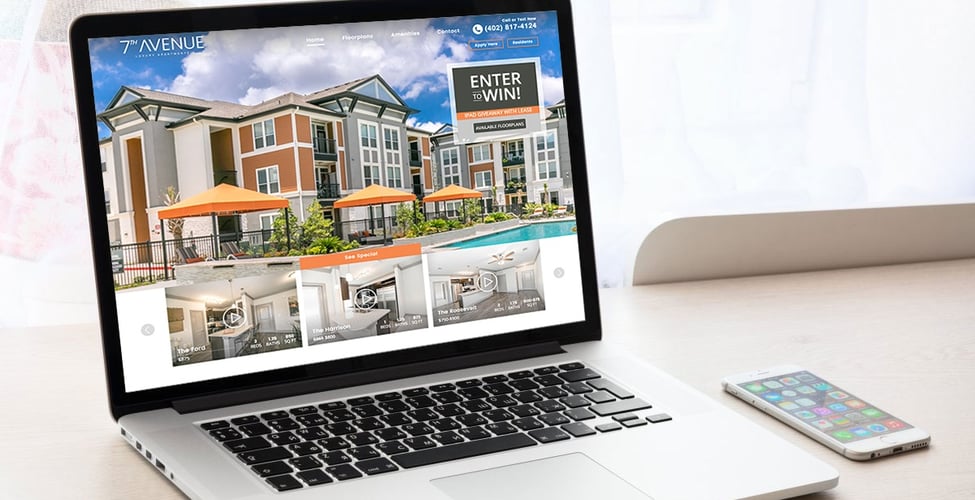Over the past few months, our team has traveled to various multifamily conferences and met with apartment professionals across the United States.
Many asked us, "Do all of my apartment communities need to have a website?"
Our prevailing sentiment is every renter deserves the chance to see the inside of units and get clear information about specific apartment communities, which a dedicated website delivers better than any digital marketing platform.
Yet there are many factors to consider in whether a community needs a website to achieve leasing and occupancy success, including property type, rent, unit count, budget, and turnover rate.
We'll explore each of those things in this blog to give the best answer to the question, "Which apartment communities need to have their own website?"
What is your community's property type?
Property type is the most critical factor in deciding which communities need a website.
There are three well-defined types: A-class, B-class, and C-class.
A-class properties include luxury or "lifestyle" apartment communities with unique amenities and modern unit designs. They also have more money available for marketing and premium-priced rents.
B and C-class properties, also known as 'renter-by-necessity' communities, have standard amenities and, generally, aren't as modern in appearance. The difference in C-class communities is that they typically have smaller marketing budgets and only accept tenants under rent-controlled or affordable housing conditions.
A-class properties must have a dedicated community website. Nearly every new community is luxury, making the online marketplace for A-class properties highly competitive. A website gives them the best opportunity to display visual content, digital touring options, and other necessary details to stand out online and appeal to the smaller pool of prospective residents who can afford to live in a luxury-style community.
Plus, A-class communities can afford to hire large marketing teams and vendors to manage a website, as well as digital advertisements and other marketing tools that attract interested prospective residents.
So, from a property type, rent, and budget perspective, A-class communities need a website.
But we often hear the question about websites from individuals who work in communities that aren't in the luxury category, so let's focus more on those other property types as we advance.
B-class properties, in almost every circumstance, need a community website, too. Yet there are a few points left to consider before making that conclusion if your property is in this class.
Things are less clear for C-class properties. While their renters would benefit from getting information from a dedicated website, it may not be feasible or necessary for a C-class community to have one.
How does your community set rent?
How a community sets and collects rents is essential in determining if it needs a website, as the answer also determines where it gathers leads.
B-class, and even some C-class apartments, that set rents at market rates need a website, especially one with accurate and up-to-date pricing information, as nearly all of their leads will come from that website. Similar communities with controlled rent prices could still benefit from a website.
However, a clear distinction occurs with affordable housing communities. Usually, these communities have most of their leads referred to them from a housing authority or other entity offline. Owning a website is less critical when it's not going to be the community's top source of leads.
What is your unit count and turnover rate?
The basis of this question comes down to a community's individual needs.
Communities with at least 100 units have enough supply to warrant establishing online demand, so it makes sense to own a website.
And communities with more units—regardless of property class—also tend to experience higher turnover yearly. Community websites combat turnover by helping more prospective residents gather the information they need to start the leasing process. Without that lever always working in the background, larger communities will struggle to replace all the residents who move out annually.
Meanwhile, smaller communities with less than 50 units typically have less turnover. That makes it easier to stabilize occupancy, so a website may be optional.
What is your budget?
A website is a significant marketing investment, especially for smaller communities with limited budgets. But when set up and utilized correctly, a website will be a community's top lease generator.
With that in mind, here's something to consider if you remain unsure whether your community can afford or benefit from a website: A website is a much better investment than paying multiple Internet Listing Services to market your apartments. You should consider getting a website if you can eliminate a few ILS subscription packages or other ineffective marketing sources from your budget. Since you're here, learn more about how RentVision can help you with an apartment community website and more.
Suppose your community has a smaller marketing budget, or other factors suggest a better fit to have a website. In that case, we'd still recommend investing some money into high-quality media content of your community that shows the inside of your units and more. That'll benefit future renters, regardless of how they find your apartments, the number of units you have, or the property's class association.
Conclusion
It's understandable why there needs to be more clarity about which apartment communities need a website to achieve consistent leasing and occupancy success and which communities can achieve those things without a website.
There are multiple factors to consider, but the truth remains that a website is an excellent investment and benefits renters for many, if not most, apartment communities.
If your community meets the criteria for needing a website, why not start now?
You can watch the video below to learn more about RentVision's apartment websites and then schedule a demo.

